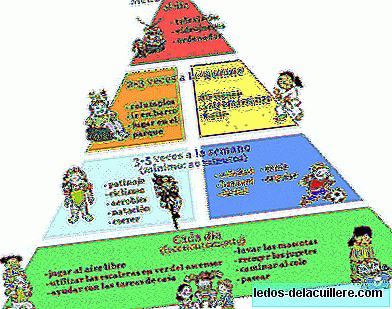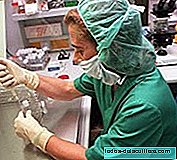
"Well, let's go prick Blanca ... Mom, are you waiting for a little while outside?" Between the "Yes, of course ... Honey, calm, I'm out here and now I come in" and the "No, I prefer to stay with her to be calmer" there is a chasm of difference, and perhaps not what you think: in the second case a girl's right is being respected, not from the mother.
Recently a study has been published that shows how the fulfillment of children's rights has improved in some hospitals in Spain, and now I will talk about it. However, there is still a long way to go because the circumstance of the previous paragraph continues to be more than it should and the answer remains the wrong one, as is the question. So for you to think about it a little, I make you a direct one: Dad and mom, do you leave your children alone in medical tests or treatments?
Is the professional's question wrong?
I just said it, the question is wrong because it is asked of the person who is not. We are talking about a children's right. According to the Rights of the Hospitalized Child, dating from 1986, a child has the right "to be accompanied by their parents or the person who replaces them as long as possible during their stay in the hospital, without impeding the application of the necessary treatments for the child". So it is the girl who has to ask: "Blanca, honey, we have to prick and it hurts a little ... do you prefer to stay mom or better wait outside?". Blanca's answer may be a "I'd rather stay" or take a leap towards her mother, in Koala mode, and cry without letting go. Both answers say the same thing: "to stay". Some clueless will say that he prefers mom to leave, but they are so minority, that it's almost absurd to ask.
Only in cases where the intervention is very important, such as when a cardiovascular resuscitation is performed on a child to try to save his life or similar circumstances should the parents be asked what they prefer, whether to stay or leave.
What does the study say?
But we go to the studio and talk more about it. Researchers at the University Hospital of Sant Joan de Déu, in Esplugues de Llobregat, Barcelona, analyzed the policies of 22 Spanish hospitals with emergency services in order to know if the parents were present at the tests, what was the opinion of the professionals at respect and see if this changed over time. For this they did surveys in the year 2008 and in the year 2012.
In these surveys they talked about invasive procedures defining them as follows: non-invasive procedures (blood collection, peripheral route placement, bladder and gastric catheters), moderately invasive (lumbar puncture, wound suture, skeletal reduction or traction) and very invasive (thoracentesis, endotracheal intubation and CPR maneuvers).
As a picture is worth a thousand words, I leave you first with the tables of the results and so we comment more clearly:

Surprisingly, in 2008 eight of the 22 hospitals did not give rise to any situation for parents to be with children. They were simply thrown out (invited out) to perform the procedures only with the children. Luckily, in just 4 years this has changed and there is no longer any hospital that refuses all interventions without parents.
However, that does not mean that there is still no way to go. When performing blood tests, only 10 allowed parents to be with children in 2008 and 19 are allowed in 2012, but there are still three that should change policies. A blood draw is an annoying and painful procedure for a child and never, never, should live it without the support of someone trustworthy, who then happens what happens, who are afraid, not to say dread, have a traumatic memory of childhood throughout life and reach adulthood saying that "to me is that the needles ...", getting many to pass out just by feeling the prick.
If you look at the rest of the table, the same. It has improved a lot, but it is that in 2008 the numbers were unfortunate. In 2012 better, but as I say, there is much to go. When suturing wounds, for example, the same, there are seven hospitals that do so without parents.
The funny thing is that in the three most invasive procedures, from no hospital have they passed to two that do allow parents to stay (I did not expect this to improve). They are very serious tests or processes, in which the child's life is in danger. Obviously, no one can be forced to be there, but surely more than one parent will want to be present even then, and that is why I think you should be given an option to it (unless your presence hinders the work of professionals, since which are very difficult moments).
But why can't parents be with their children?
There will come a day when we look at the past and ask ourselves the same thing: couldn't they come in? why? And the answer you have in the following table of the study:

In 2008 some things were said and in 2012 the thing has changed a lot. It seems that professionals have seen that parents are not really Neanderthals and they are able to control their nerves for the benefit of the child's tranquility, which prefers to be accompanied. Similarly, professionals have been able to respond to this situation and are able to work while parents are present, and this argument is less and less used. In reference to the nerves of children, which from what I see was little used in 2008, now only a hospital talks about it.
Personally, when I have encountered situations like this, there are usually several arguments, which are the ones commented, that the children are calmer alone, which is a lie, because they are in any case distressed (or cushioned), that parents are going to annoy, preventing professionals from doing their job, which is also a lie until proven otherwise and sometimes they have also told me about asepsis, something like if because of me the child was going to get infected from something by my presence alone , which is also a lie, unless I start playing where they are working, which is not the case.
Do they let you stay with your children?

So after seeing this I ask you: Do they let you stay with your children when they are going to have an invasive test or treatment? Because if it is not a very serious process, they should also do it without inviting anyone to go outside. It is your children, you are their parents and guardians and you are responsible for them even at that time. Paternalistic medicine, that in which health professionals take care of the situation completely from the moment you enter the hospital, knowing more about how the parents or the child will behave than themselves, has long been left behind. And if there are still cracks, they should disappear.
A sign of this is the change in mentality that is observed, going from a time when parents can get in the way and children become more nervous in their presence to one in which the presence of parents is positive because they see what happens, because the children are accompanied at all times and because in the future we may be seen, those in white, less like "those who hurt and treat you like things".
In addition, as professionals become accustomed to working with the presence of family members, communication improves, treatment with the child improves (which no longer relates their arrival with their parents' departure from the room) and thus improves the job.
Now, everything must be said. Those responsible for the study received a response from their surveys of 22 hospitals in Spain, but they they sent the surveys to a total of 42 hospitals. What information would we have now if everyone had responded? Didn't they answer because they weren't interested in the subject or because they don't think parents should be present at any test? I say this because, unfortunately, there are still very bad cases of hospitals that do not let the parents stay even when the child is simply admitted, with more restrictive visiting hours than if it were a prison.
This must change. He is already doing it, as we have seen, but there is still much to go and nobody better than you, parents, to fight for them. They are your children, your responsibility, and it is their right that you accompany them in those hard times.
"It is that a child can not understand that we hurt him and being in front of you do nothing to avoid it," said a doctor after putting a stitch to my son in our presence, after a long discussion because we did not leave the cubicle of Emergencies "No, what he cannot understand is that you hurt him and we are not present to give him encouragement and affection," we replied.












